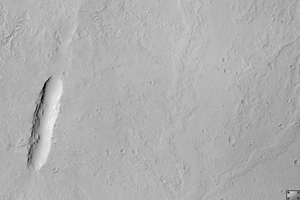
Click on image for larger versionLike the other major shield volcanoes on Mars, Arisa Mons has a caldera (large volcanic crater) at its summit.
Calderas form when magma (molten rock) is removed from the magma chamber in the volcano, and the roof of the magma chamber collapses into the resulting void. In the case of Arsia Mons, there are relatively young lava flows that overtop the northeast rim of the caldera.
This HiRISE image (PSP_002157_1715) samples some of these lava flows. The long elliptical depression is the summit crater of a small shield volcano that fed some of these lava flows. At HiRISE resolution, we see that even these younger lavas are covered by a thick layer of dust. The small dark-rayed crater in the southwest edge of the image shows that the rock under the dust is dark, as expected of lava.
Observation Geometry
Acquisition date: 1 January 2007
Local Mars time: 3:41 PM
Degrees latitude (centered): -8.4 °
Degrees longitude (East): 240.1 °
Range to target site: 244.7 km (153.0 miles)
Original image scale range: 49.0 cm/pixel (with 2 x 2 binning) so objects ~147 cm across are resolved
Map-projected scale: 50 cm/pixel and north is up
Map-projection: EQUIRECTANGULAR
Emission angle: 0.1 °
Phase angle: 57.1 °
Solar incidence angle: 57 °, with the Sun about 33 ° above the horizon
Solar longitude: 165.0 °, Northern Summer
NASA's Jet Propulsion Laboratory, a division of the California Institute of Technology in Pasadena, manages the Mars Reconnaissance Orbiter for NASA's Science Mission Directorate, Washington. Lockheed Martin Space Systems, Denver, is the prime contractor for the project and built the spacecraft. The High Resolution Imaging Science Experiment is operated by the University of Arizona, Tucson, and the instrument was built by Ball Aerospace and Technology Corp., Boulder, Colo.

